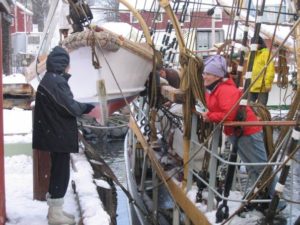The Maritime world offers a variety of careers. When one thinks of the industry, one might think that the only opportunities lie offshore, but that is just not the case. The Operations and Administrative side play vital roles in the organization of a program, ship, and/or company. Maggie Ostler, Chief Operations Officer for Windward Isles Sailing Ship Company, took some time out of her busy and interesting schedule to tell us about her trajectory – from trainee to boss…
“When I first signed aboard the sail training ship Picton Castle back in the spring of 2005, I had no idea how big an impact the decision to sail would have on my life. I knew I wanted an adventure, I knew I wanted to challenge myself, and I knew I wanted to travel. At the time, I didn’t know it would lead to a career in the marine industry and a permanent move halfway across the country.
I fell in love with the idea of sailing around the world on a square rigger, saved every penny I had for a number of years to afford to do it, and took the thrilling and terrifying leap of signing aboard Picton Castle as a trainee crew member for the ship’s fourth world circumnavigation. 
I knew that living in close quarters with others and working as part of a team with the same people day and night wouldn’t be a problem for me. I had spent 12 years already working in summer camps and outdoor education centres in Ontario, Canada. My greatest fear before I joined the ship is that I wouldn’t find anything on board that I was good at, that I wouldn’t have a way to be a contributing crew member.
What I learned fairly early into my voyage is that just like a camp or outdoor centre, there’s a lot of administration that goes on behind the scenes to make it all happen. I apprenticed with the ship’s purser on that voyage, learning how to clear the ship in and out of different countries with customs and immigration, how to keep accurate inventories and manage purchasing, how to manage ship’s petty cash, how to work the ship’s satellite communications equipment, and how to keep the ship’s records up to date. I became the purser on the following summer’s voyage, and for the winter after that in the Caribbean.
Of course, I also stood watches all the way around the world. I learned the running rigging and how to handle lines under strain, became proficient at furling headsails, deeply appreciated dark star-filled nights on forward lookout, steered the ship in open ocean and the close quarters of a busy harbour, and attempted to be a reliable deckhand and good shipmate.
The following spring, two years after I first signed aboard as a trainee, I moved directly from the ship to beautiful Lunenburg, Nova Scotia to work in the Picton Castle shore office. Because of my work as the purser on board, I had a good understan ding of ship operations and how to answer the questions of prospective future trainee crew members. The learning curve was steep in the beginning, as was the adjustment to living and working on land again.
ding of ship operations and how to answer the questions of prospective future trainee crew members. The learning curve was steep in the beginning, as was the adjustment to living and working on land again.
Over time, my responsibilities with Picton Castle have grown and I’m now the Chief Operations Officer of the company that owns and operates Picton Castle. I am responsible for the day to day operation of the company and for all operations support to the ship and crew. Like with any job, there are some parts that must be done (tax audits, insurance renewals, contract negotiations) in order to get to the parts that are really enjoyable (interviewing trainee candidates, developing voyage itineraries, meeting and interacting with people all over the world). Although I am rarely aboard the ship at sea, every day is still an adventure.
In the course of making arrangements for Picton Castle, I have learned about all sorts of details and processes in different ports around the world. Because of my familiarity with the coasting trade license process in Canada, I was asked to assist a fleet of international vessels coming to Canada with the required paperwork for a major tall ships event in 2017. And I have just become a director of the board of Tall Ships Canada, contributing to the industry of sail training.
What has kept me interested in Picton Castle and the wider marine industry all these years is that no two days are ever the same. There are always new challenges to face and new conditions in which to face them. The solution that worked last time probably won’t work exactly the same way again, so constant, ongoing analysis and creativity is required.
Aboard Picton Castle, we often say “the ship comes first.” It becomes our mantra, the guidance that forms the foundation of all the decisions we make. Our shore crew use the same phrase, constantly acting in the best interests of the ship and crew. Admittedly, it is sometimes inconvenient, sleeping with my cell phone next to my bed in case of an emergency phone call from the ship at any hour, or answering emails from the ship on evenings or weekends because information is requested and needed right away. But having started as a trainee myself, and knowing the impact the sail training experience had on me personally and on my shipmates, I understand the value of the experience aboard Picton Castle and am dedicated to being part of providing that experience to the next crew of trainee sailors.”
– Maggie Ostler – Chief Operations Officer – Windward Isles Sailing Ship Company
